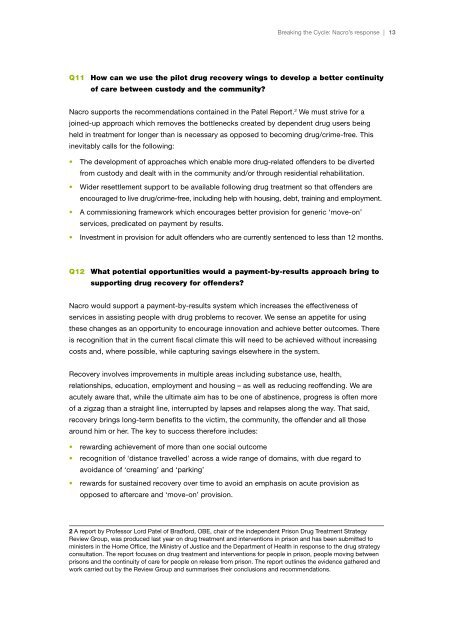Nacro's response to Breaking the Cycle Green Paper
Nacro's response to Breaking the Cycle Green Paper
Nacro's response to Breaking the Cycle Green Paper
You also want an ePaper? Increase the reach of your titles
YUMPU automatically turns print PDFs into web optimized ePapers that Google loves.
<strong>Breaking</strong> <strong>the</strong> <strong>Cycle</strong>: Nacro’s <strong>response</strong> | 13Q11 How can we use <strong>the</strong> pilot drug recovery wings <strong>to</strong> develop a better continuityof care between cus<strong>to</strong>dy and <strong>the</strong> community?Nacro supports <strong>the</strong> recommendations contained in <strong>the</strong> Patel Report. We must strive for ajoined-up approach which removes <strong>the</strong> bottlenecks created by dependent drug users beingheld in treatment for longer than is necessary as opposed <strong>to</strong> becoming drug/crime-free. Thisinevitably calls for <strong>the</strong> following:• The development of approaches which enable more drug-related offenders <strong>to</strong> be divertedfrom cus<strong>to</strong>dy and dealt with in <strong>the</strong> community and/or through residential rehabilitation.• Wider resettlement support <strong>to</strong> be available following drug treatment so that offenders areencouraged <strong>to</strong> live drug/crime-free, including help with housing, debt, training and employment.• A commissioning framework which encourages better provision for generic ‘move-on’services, predicated on payment by results.• Investment in provision for adult offenders who are currently sentenced <strong>to</strong> less than 12 months.Q12 What potential opportunities would a payment-by-results approach bring <strong>to</strong>supporting drug recovery for offenders?Nacro would support a payment-by-results system which increases <strong>the</strong> effectiveness ofservices in assisting people with drug problems <strong>to</strong> recover. We sense an appetite for using<strong>the</strong>se changes as an opportunity <strong>to</strong> encourage innovation and achieve better outcomes. Thereis recognition that in <strong>the</strong> current fiscal climate this will need <strong>to</strong> be achieved without increasingcosts and, where possible, while capturing savings elsewhere in <strong>the</strong> system.Recovery involves improvements in multiple areas including substance use, health,relationships, education, employment and housing – as well as reducing reoffending. We areacutely aware that, while <strong>the</strong> ultimate aim has <strong>to</strong> be one of abstinence, progress is often moreof a zigzag than a straight line, interrupted by lapses and relapses along <strong>the</strong> way. That said,recovery brings long-term benefits <strong>to</strong> <strong>the</strong> victim, <strong>the</strong> community, <strong>the</strong> offender and all thosearound him or her. The key <strong>to</strong> success <strong>the</strong>refore includes:• rewarding achievement of more than one social outcome• recognition of ‘distance travelled’ across a wide range of domains, with due regard <strong>to</strong>avoidance of ‘creaming’ and ‘parking’• rewards for sustained recovery over time <strong>to</strong> avoid an emphasis on acute provision asopposed <strong>to</strong> aftercare and ‘move-on’ provision. A report by Professor Lord Patel of Bradford, OBE, chair of <strong>the</strong> independent Prison Drug Treatment StrategyReview Group, was produced last year on drug treatment and interventions in prison and has been submitted <strong>to</strong>ministers in <strong>the</strong> Home Office, <strong>the</strong> Ministry of Justice and <strong>the</strong> Department of Health in <strong>response</strong> <strong>to</strong> <strong>the</strong> drug strategyconsultation. The report focuses on drug treatment and interventions for people in prison, people moving betweenprisons and <strong>the</strong> continuity of care for people on release from prison. The report outlines <strong>the</strong> evidence ga<strong>the</strong>red andwork carried out by <strong>the</strong> Review Group and summarises <strong>the</strong>ir conclusions and recommendations.
















